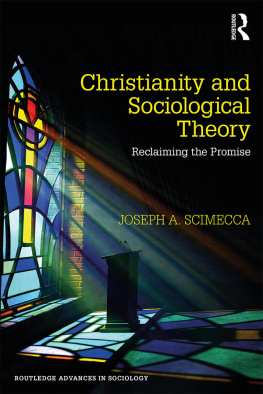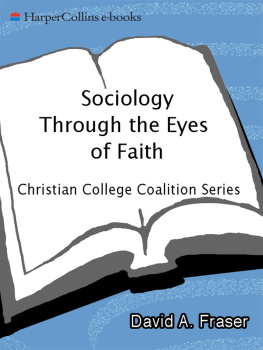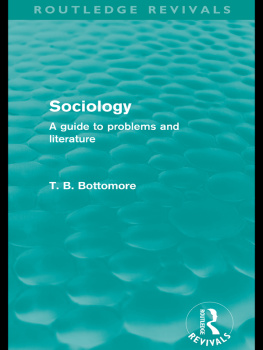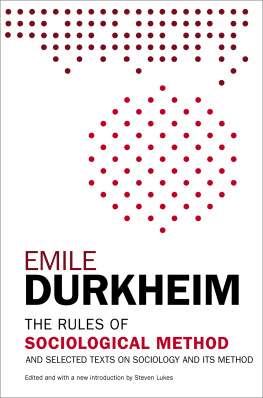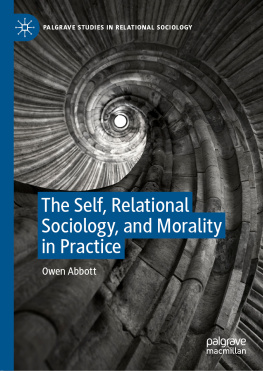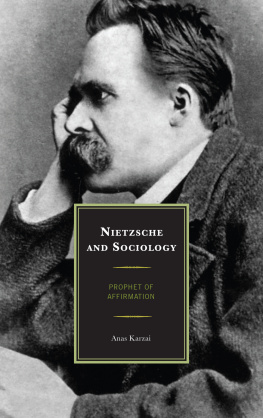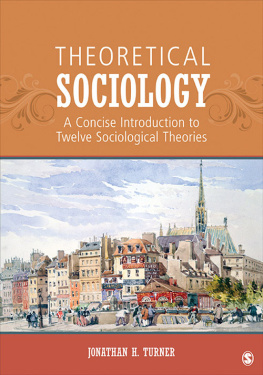
CHRISTIANITY AND SOCIOLOGICAL THEORY
This book offers a history of sociological theory from a Christian perspective, tracing the origins of sociology from the beginnings of Western science as introduced by the Scholastics of the twelfth century, which, when combined with their emphasis on rationality, led to the Enlightenment science of manan emphasis that eventually resulted in sociology, which combined empiricism and a Christian moral philosophy. With chapters focusing on the Scholastics, the Enlightenment, the rise of sociology in France, Germany, and the United States, and the legacy of Positivism, Christianity and Sociological Theory shows how the emphasis on moral philosophy was eventually lost as sociology rejected Christian underpinnings, resulting in what can only be described as an extremely limited sociology. A rigorous exploration of the trajectory of the discipline from its Christian origins, this volume reveals the potential that exists for sociology in an era of postmodern thought to reclaim its promise through a re-introduction of Christianity.
Joseph A. Scimecca is Professor of Sociology at George Mason University, USA. He is the author of Society and Freedom: An Introduction to Humanist Sociology , Education and Society and The Sociological Theory of C. Wright Mills , the co-author of Crisis at St. Johns: Strike and Revolution on The Catholic Campus , Classical Sociological Theory: Rediscovering the Promise of Sociology and Sociology: Analysis and Application , and the co-editor of Conflict Resolution: Cross Cultural Perspectives .
ROUTLEDGE ADVANCES IN SOCIOLOGY
For a full list of titles in this series, please visit www.routledge.com/series/SE0511
245 Practicing Art/Science
Experiments in an Emerging Field
Edited by Philippe Sormani, Guelfo Carbone and Priska Gisler
246 The Dark Side of Podemos?
Carl Schmitts Shadow in Progressive Populism
Josh Booth and Patrick Baert
247 Intergenerational Family Relations
An Evolutionary Social Science Approach
Antti O. Tanskanen and Mirkka Danielsbacka
248 Performing Fantasy and Reality in Contemporary Culture
Anastasia Seregina
249 The Philosophy of Homelessness
Barely Being
Paul Moran and Frances Atherton
250 The Sociology of Knowledge Approach to Discourse
Investigating the Politics of Knowledge and Meaning-Making
Edited by Reiner Keller, Anna-Katharina Hornidge and Wolf J. Schnemann
251 Christianity and Sociological Theory
Reclaiming the Promise
Joseph A. Scimecca
CHRISTIANITY AND
SOCIOLOGICAL THEORY
Reclaiming the Promise
Joseph A. Scimecca

First published 2019
by Routledge
2 Park Square, Milton Park, Abingdon, Oxon OX14 4RN
and by Routledge
711 Third Avenue, New York, NY 10017
Routledge is an imprint of the Taylor & Francis Group, an informa business
2019 Joseph A. Scimecca
The right of Joseph A. Scimecca to be identified as author of this work has been asserted by him in accordance with sections 77 and 78 of the Copyright, Designs and Patents Act 1988.
All rights reserved. No part of this book may be reprinted or reproduced or utilised in any form or by any electronic, mechanical, or other means, now known or hereafter invented, including photocopying and recording, or in any information storage or retrieval system, without permission in writing from the publishers.
Trademark notice : Product or corporate names may be trademarks or registered trademarks, and are used only for identification and explanation without intent to infringe.
British Library Cataloguing-in-Publication Data
A catalogue record for this book is available from the British Library
Library of Congress Cataloging-in-Publication Data
Names: Scimecca, Joseph A., author.
Title: Christianity and sociological theory : reclaiming the promise / Joseph A. Scimecca.
Description: Abingdon, Oxon ; New York, NY : Routledge, 2019. | Series: Routledge advances in sociology ; 251 | Includes bibliographical references and index.
Identifiers: LCCN 2018021588| ISBN 9781138606418 (hbk) | ISBN 9781138606425 (pbk) | ISBN 9780429467660 (ebk)
Subjects: LCSH: Christian sociologyHistory. | SociologyHistory.
Classification: LCC BT738 .S393 2019 | DDC 261.5dc23
LC record available at https://lccn.loc.gov/2018021588
ISBN: 978-1-138-60641-8 (hbk)
ISBN: 978-1-138-60642-5 (pbk)
ISBN: 978-0-429-46766-0 (ebk)
Typeset in Bembo
by Swales & Willis Ltd, Exeter, Devon, UK
For my mother-in-law, Solveig Lundberg (19152001), and father-in-law, Rev. Walter Lundberg (19082001), who, each in their own way, showed me what it meant to be a Christian.
In writing this book, Ive incurred many debts. My thanks, first of all, to Neil Jordan and Alice Salt of the Routledge editorial staff, to Megan Symons at Swales & Willis, and to Kelly Derrick who copy-edited the final draft. Its been a pleasure to work with you.
Because the book is controversial, I tried out my arguments with numerous friends and colleagues, some of whom agreed with my point of view and some who didnt. But in all cases they were supportive and encouraging and forced me to sharpen my case for the importance of Christianity in the development of sociological theory. Thank you to John Farina, Dave Gilliam, Glenn Goodwin, Paul Gross, Dae Young Kim, Evans Mandes, Randy Newman Roy Nyberg, Paul Porter, Linda Seligmann, and John Stone. My apologies for anyone I may have inadvertently failed to mention.
Special thanks are in order to Rutledge Dennis, Arnold Sherman, and Susan Trencher. No one could ask for better friends, colleagues, and helpful critics. What they did was well beyond the call of duty. It goes without saying that much of the strengths and none of the weaknesses of this book are attributable to them.
Then there is my family: my daughter, Faith Scimecca, my daughter Kirsten Lopresti, my son-in-law, Tony Lopresti, and my granddaughters, Julia and Natalie Lopresti, who with their love never cease to bring me joy.
And finally, to the love of my life, my wife Elsie. As always, thank you for just being Elsie.
There are basically two views concerning the origins of the discipline of sociology. The first holds that sociology began with Auguste Comte, who is referred to in introductory sociology textbooks as the father of sociology. Legend has it that Comte wanted to call the new field of study social physics as a way of denoting its status as the queen of the sciences. However, because one of his contempories, the Belgian mathematician, Adolphe Quetelet, a man who Comte despised, had previously used the term social physics in his writings, Comte would not acknowledge Quetelet in any way. So, in 1839, Comte coined the term sociologya hybrid of the Greek word socio (society) and the Latin word log y (the study of something on a high level). Sociology, as Comte (1853/1896) envisioned it, would be a science that uncovered social laws, just as physics uncovered physical laws. What seems forgotten, though, is that in later life, Comte (1851/1976a) developed what he called a religion of humanity, which called for a secularized version of Catholicism to ensure a moral order for society.
The second view states that sociologys beginnings predate Comte, and can be traced to the combining of two intellectual frameworks that emerged out of the Enlightenment: moral philosophy (the belief that rational thought can provide the foundation for morality and ethical judgments) and empiricism (the belief that all knowledge is derived from experience). A group of French and Scottish philosophers ( Philosophes as they were collectively called) sought to establish the science of man, a social science that fused morals and science, and it is their writings that eventually lead to the establishment of sociology as a discipline worthy of study in the academy (see Becker 1971b; Seidman 1983).
Next page
